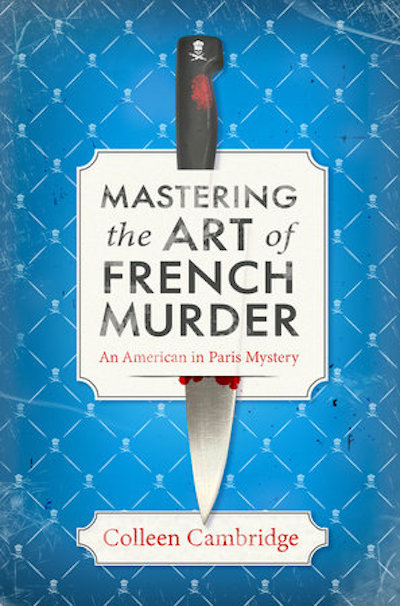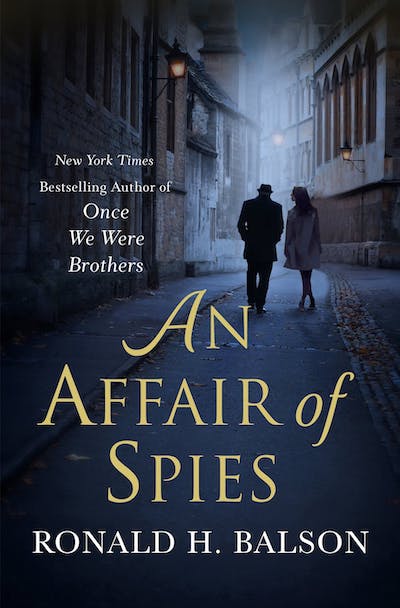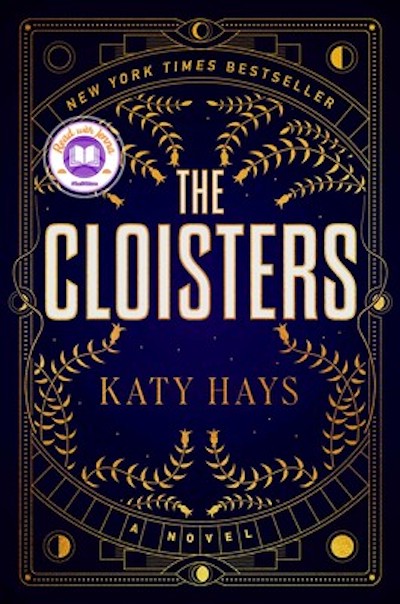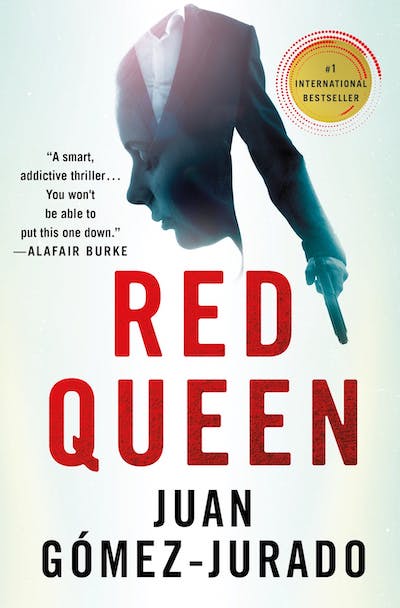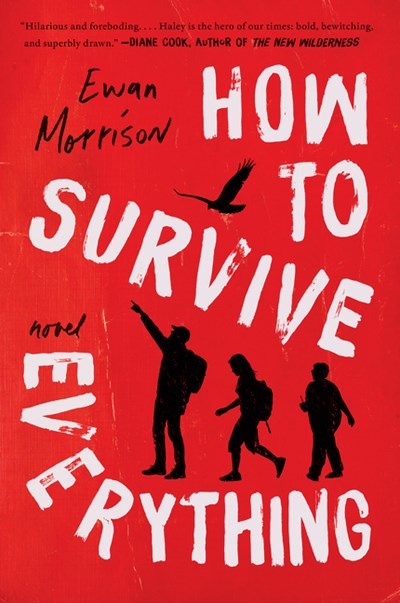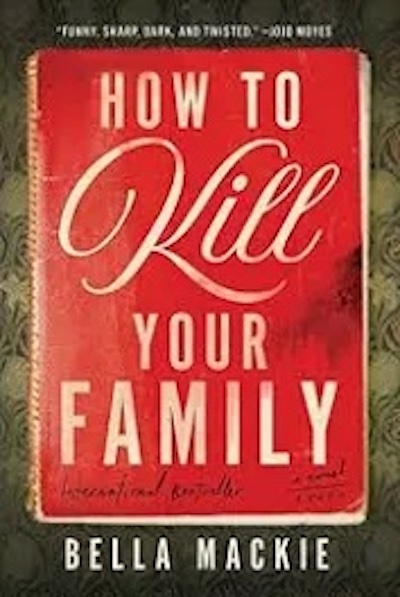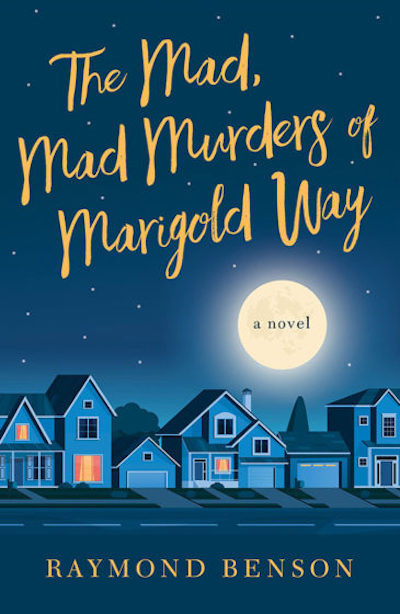Cambridge’s newest series has everything going for it. A magical setting: Paris awakening after World War II, with its fabled lights returning and food overflowing in the marketplaces. A great lead: sophisticated Tabitha Knight, who’s abandoned Detroit, and a dull fiancé, to live with her older French uncle and his longtime partner. Plus some star power: Tabitha’s buddy and neighbor, the young Julia Child, a student at Le Cordon Bleu who can always be found in her kitchen, stuffing some poor bird. Cambridge does a brilliant job capturing Julia with her quirky diction, fluty enunciation, and joie de vivre. But some of that joie flies out the window when a young woman is found dead in Julia’s basement; the murder weapon is a knife from Julia’s kitchen; and a note, in Tabitha’s handwriting, is found on the woman’s person. Tabitha—every bit the modern, independent woman—heads off to track down leads, break into the victim’s apartment, and befriend an American theater group, all the while drawing the ire—and maybe admiration?—of the taciturn, but so very handsome, Inspector Merveille. A first-rate traditional mystery with strong characterization that is certain to appeal to a broad readership, especially fans of Jacqueline Winspear, Rhys Bowen, and Cambridge’s own Phyllida Bright series.
Star
It’s 1943, and U.S. Army Sergeant Nathan Silverman is preparing to head back to Germany, his homeland, to fight the Nazis and, he hopes, find his close-knit Jewish family still alive. He’s one of the “Ritchie Boys,” members of a real WWII army unit made up of Germans and Austrians who were trained in intelligence and sent back to Europe as spies. But his days at Camp Ritchie are interrupted when Uncle Sam orders him to New York City to prepare for a different mission. Nathan has a valuable connection: his father is a physicist with the Nazi equivalent of the Manhattan Project, and the allies can use Nathan to find out how close Germany is to building a nuclear bomb. One problem: Nathan knows little about physics, but the army has taken care of this. His partner on the trip will be an American physicist, Dr. Fisher, whom Nathan is surprised to find is a young woman rather than the aging male academic he expected. The setup is absorbing on its own, with Balson (winner of the National Jewish Book Award for The Girl from Berlin) providing actual details about the race on both sides of the Atlantic to make a devastating weapon. Once the pair heads off, the action doesn’t disappoint either, at one point involving the most audacious plan imaginable to trick the enemy. There are sad moments and romantic ones here, but overall this is one nailbiting espionage scene after another, and perfect for fans of the large World War II spy genre.
Most of us are familiar with the kidnapping of Charles and Anne Morrow Lindbergh’s baby, Charlie, in 1932, which was known as “the crime of the century.” So what can a fictionalized version of the events offer readers today? A whole lot more, it turns out. Fredericks has Betty Gow, the baby’s nanny, narrate this tale, which begins with Betty’s arrival in Detroit from Scotland—in pursuit of love gone wrong—and ends several years later with her permanent return to Glasgow. Kudos to Fredericks for creating in Gow such a hugely compelling character: smart, introspective, full of humor, a loving nanny. She’s also a terrific social observer, watchful of class distinctions, and all too aware of the inequality of the sexes. The first third or so of the book builds towards the abduction of Charlie—it’s incredibly nerve racking—while the middle third is centered on the messy aftermath of the crime: the frenzied press, the myriad ransom notes, the continual interrogations by detectives. In the final third, the narrative builds again as Betty returns from Scotland to testify in the trial of Bruno Hauptmann, who was eventually convicted and electrocuted, and the courtroom drama that unfolds is nothing less than brilliant. As fans of the Jane Prescott mysteries can testify, Fredericks is especially adept at historical settings, and this book doesn’t disappoint. The Lindbergh Nanny can cross-over in all kinds of directions, and should appeal to readers of crime fiction, historical fiction, women’s fiction and those just needing a solid read. Librarians: watch the holds list on this one.
A wonderfully dark novel rich in characterization. After Ann Stillwell graduates from college, she doesn’t waste a minute more in Walla Walla, WA, and heads to New York City’s Metropolitan Museum of Art (Met), where she has secured a summer position as curatorial associate. But there’s a mix up, and Ann ends up at the Cloisters, the Met’s museum and garden devoted to medieval art, located at the remote northern tip of Manhattan. Here she ends up working with Rachel Mondray, who is everything Ann isn’t: Yale educated, Harvard bound, immensely wealthy. Will they be friends, enemies, or frenemies? Friends, it turns out, providing they stick to Rachel’s terms. Under the tutelage of Patrick, the curator-in-charge, they research early Renaissance tarot cards in preparation for an upcoming exhibit. But the cards aren’t just visually beguiling. They are powerful in ways that go well beyond art history, capable of inspiring evil today. Hays does a wonderful job of opening up the lives of both Ann and Rachel, who forge an alliance—like the contestants in a Survivor-like TV show—that will see them safely through the summer. Or will it? Fans of Shapiro’s The Art Forger, Perez-Reverte’s The Flanders Panel and Santlofer’s The Last Mona Lisa will love this book.
Hartstone’s debut draws on the real-life town of Marshall, Texas: a quarter of all patent cases in the country are heard there. In the 1990s, Judge T. John Ward made his courtroom in the Eastern District of Texas, or EDTX, a kind of patent-trial machine, using timers when lawyers spoke and limiting the number of pages they could file. In addition, Marshall’s juries award unusually high amounts in damages, all making EDTX attractive to those suing for patent infringement. Judge Ward is called Gardner here, but the practices are the same. Appearing in his court is Amir Zawar, whose rideshare app may have stolen another product’s design. Representing Zawar is James Euchre, a lawyer who tells himself he’s quit smoking…he only has a few per day, after all…and is trying to limit himself to three drinks a day. His resolve is tested when his client is, shall we say, reluctant to go along with court decorum. It’s not a great idea to hit your lawyer and threaten the judge’s life, but it’s even worse when the judge is later found dead. Euchre has never worked on a criminal case before, let alone one that could involve the death penalty, but Zawar insists he stay in the lead counsel seat, with both characters, along with Euchre’s love-interest coworker in the trial, taking readers on a tension-filled ride to justice. Lawyers, such as one Mr. Grisham, have long written compelling legal thrillers; this book, by an experienced TV writer, stacks up favorably against the legal greats.
Hyped as sweeping bestseller lists in Europe, and for good reason, this has all the velocity and thrills of Stieg Larson’s Millennium series but none of the eyeroll-inducing misogyny. “Antonia Scott allows herself to think of suicide no more than three minutes per day,” opens the book. She believes her life to be destroyed as her husband has been in a coma for years. Jon Gutiérrez is the latest disgraced Madrid cop forced by a mysterious character, who calls himself Mentor, to try to get Antonia back on the force. Jon’s between police partners, having left “the Cristiano Ronaldo of Scrabble,” his previous partner, at his last job. He doesn’t have a boyfriend at the moment either. That’s lucky, because it takes all his wiles to deal with Antonia, a woman who’s been trained to have superhuman recall and powers of deduction. She returns to work, and her odd-couple partnership with Jon is pitted against the sinister kidnapper of one of the richest women in Spain, who has left what may be religious symbolism at crime scenes and who drags the partners into some incredibly tense situations (and has an out-of-the-blue twist in store). Word lovers will relish Antonia’s asides that spring from her hobby of collecting expressive words, such as the Inuit Ajunsuaqq, which means to bite a fish and get a mouthful of ash, and the Wagiman murr-ma, searching for an object in the water with your feet. It’s all engrossing, and best of all, this is the first in a trilogy.
Meet the confidence man (or woman), also known as the scammer, the grifter, the swindler. He’s long been a part of our national identity. Don’t believe me? Go back 175 years and take a peep at Melville’s last novel, Confidence-Man. Here, Frumkin updates our national passion—American dream, by any means!—in an epic tale of betrayal, at once gloriously hilarious and heartbreakingly sad. Ezra and Orson meet up one summer as teens at Last Chance Camp, the final stop before juvenile detention. They become lovers of sorts, with homely Ezra in love and gorgeous Orson in like. They’re equally poor, already petty criminals as well as small-time dope dealers. This is a clear case in which the whole is greater than the sum of its parts, because Ezra and Orson don’t just succeed at digging their way out of poverty. In ten years, they propel themselves into absolutely incredible wealth all through lying, scheming, and cheating. It’s a delight to watch. Eventually, they reach a sort of zenith with NuLife, a kind of wellness practice involving magnets—sort of a cross between L. Ron Hubbard’s Dianetics and Gwyneth Paltrow’s goop. This fast-paced, wonderfully unique novel holds a mirror up to American culture and asks all the right questions. It’s the answers that are so disturbing.
A brilliant look at pandemics through the eyes of Haley, a 16-year-old girl who, with her little brother, are abducted from their mother by their father and taken to a rural farm—no Internet, no cell phones—in northern Scotland. They join a handful of survivalists, Haley’s dad is clearly the ringleader, and they’re waiting for the next pandemic, which should be arriving any day; a new virus, more horrible than anything we can imagine, has just made its way to the U.K. Bleak? Indeed. But fascinating, and even comic at times. Haley writes the book as a sort of parody of her father’s survivalist manual, with her own sarcastic spin (“How to Abduct Your Own Children,” “Home Surgery for Beginners.”) Add to this rich details about life on the compound, a budding romance with the one other teen in lockdown, and continual speculation about her parents, both of whom she believes to be crazy—any reader would agree—and whose epic divorce left her having to always choose between them. At the heart of the book is the question of truth. Is the world beyond the barbed wire that surrounds the farm really erupting in chaos, with riots in the streets and bands of the infected roaming the countryside? Or is life as they knew it chugging along, little different except that Haley and her family have left it? And does Haley—or any of the survivalists—really want to know the answer? A bit of crime fiction, a lot of dystopia, and 100 percent compelling.
Best title of the year, amirite? And the best antihero as well. Grace Bernard was raised in London by her loving but impoverished single mom. Her father, a multi-millionaire, won’t have anything to do with them, even when Grace’s mother is dying and begs for support for their daughter, then a young teen. But by her mid-twenties, Grace is ready to take matters into her own hands and avenge her mother’s hard life. Grace doesn’t want to just polish off dear old dad. She slowly and meticulously plots the murders of everyone on the paternal side of her family, with her father last on the list, having watched his parents, children, and in-laws die before him. Yes, it’s dark, but it’s also deliciously wicked and brilliantly plotted, so much so that Grace is a bit wistful that no one except her will enjoy the genius of it all. Thus this book, which is meant to be locked away and discovered by future generations. Until something most unexpected occurs, upending Grace’s brilliant plan. Grace is sophisticated, urbane, droll, and at times risible. I could listen to her voice forever.
Benson is best known as the first American author of continuation James Bond novels, but apart from being fictional and starring a man, this unusual and excellent read is the furthest thing from 007 imaginable. The story starts with an omniscient, unnamed narrator introducing readers to Lincoln Grove, Illinois, where two back-to-back streets (map included) are the setting for what the gleeful narrator describes as an updated version of Thornton Wilder’s play “Our Town.” (Readers will also be reminded of Jim Carrey’s synthetic surrounds in “The Truman Show.”) Scott Hatcher is having an unusual day there, awaking to find his wife, Marie, gone. They haven’t been getting along but have agreed to postpone a divorce decision because it’s May 2020 and the world is in pandemic turmoil. When Scott finally reports Marie missing, it turns out that a neighbor’s husband is also AWOL, a man who has recently been the subject of both Marigold Way gossip and police attention as masks, drugs and other COVID-related items have been stolen from his job. As the missing-persons investigation becomes much more, the narrator’s cheerful, exclamation-point filled observations take on a sinister cast and the neighbors—this takes place almost solely in one setting, just like a play—all become suspect, their foibles and ambitions revealed. What a saga! As well as “Our Town,” readers can try this alongside Máirtín Ó Cadhain’s The Dirty Dust: Cré na Cille, which features a town’s dead folks gossiping together in a graveyard

